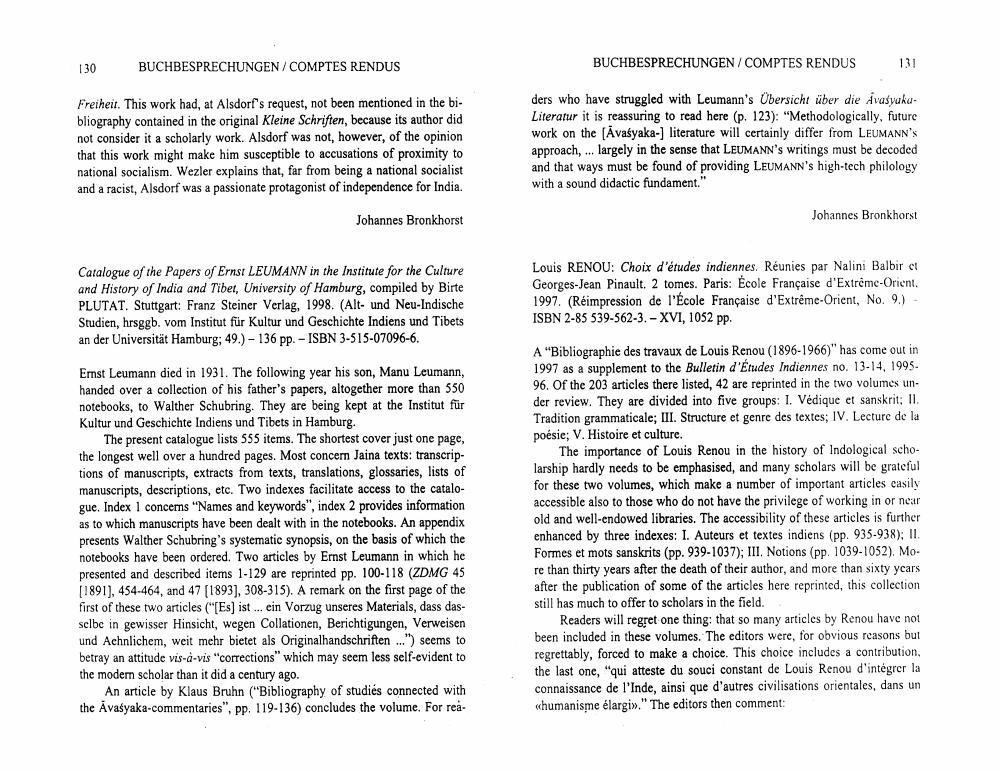Book Title: Buchbesprechungen Comptes Rendus Author(s): Johannes Bronkhorst Publisher: Johannes Bronkhorst View full book textPage 2
________________ BUCHBESPRECHUNGEN / COMPTES RENDUS BUCHBESPRECHUNGEN / COMPTES RENDUS 131 Freiheit. This work had, at Alsdorf's request, not been mentioned in the bibliography contained in the original Kleine Schriften, because its author did not consider it a scholarly work. Alsdorf was not, however, of the opinion that this work might make him susceptible to accusations of proximity to national socialism. Wezler explains that, far from being a national socialist and a racist, Alsdorf was a passionate protagonist of independence for India. ders who have struggled with Leumann's Übersicht über die vasvakaLiteratur it is reassuring to read here (p. 123): "Methodologically, future work on the [Avaśyaka-) literature will certainly differ from LEUMANN'S approach, ... largely in the sense that LEUMANN's writings must be decoded and that ways must be found of providing LEUMANN's high-tech philology with a sound didactic fundament." Johannes Bronkhorst Johannes Bronkhorst Catalogue of the Papers of Ernst LEUMANN in the Institute for the Culture and History of India and Tibet, University of Hamburg, compiled by Birte PLUTAT. Stuttgart: Franz Steiner Verlag, 1998. (Alt- und Neu-Indische Studien, hrsggb, vom Institut für Kultur und Geschichte Indiens und Tibets an der Universität Hamburg; 49.) - 136 pp. - ISBN 3-515-07096-6. Louis RENOU: Choix d'études indiennes. Réunies par Nalini Balbir et Georges-Jean Pinault. 2 tomes. Paris: Ecole Française d'Extrême-Orient. 1997. (Réimpression de l'École Française d'Extrême-Orient, No. 9.) - ISBN 2-85 539-562-3. - XVI, 1052 pp. Erst Leumann died in 1931. The following year his son, Manu Leumann, handed over a collection of his father's papers, altogether more than 550 notebooks, to Walther Schubring. They are being kept at the Institut für Kultur und Geschichte Indiens und Tibets in Hamburg. The present catalogue lists 555 items. The shortest cover just one page, the longest well over a hundred pages. Most concern Jaina texts: transcriptions of manuscripts, extracts from texts, translations, glossaries, lists of manuscripts, descriptions, etc. Two indexes facilitate access to the catalogue. Index 1 concerns "Names and keywords", index 2 provides information as to which manuscripts have been dealt with in the notebooks. An appendix presents Walther Schubring's systematic synopsis, on the basis of which the notebooks have been ordered. Two articles by Ernst Leumann in which he presented and described items 1-129 are reprinted pp. 100-118 (ZDMG 45 (1891), 454.464, and 47 (1893), 308-315). A remark on the first page of the first of these two articles ("[Es) ist ... ein Vorzug unseres Materials, dass dasselbe in gewisser Hinsicht, wegen Collationen, Berichtigungen, Verweisen und Achnlichem, weit mehr bietet als Originalhandschriften ...") seems to betray an attitude vis-à-vis "corrections" which may seem less self-evident to the modern scholar than it did a century ago. An article by Klaus Bruhn ("Bibliography of studies connected with the Avašyaka-commentaries". pp. 119-136) concludes the volume. For rea. A "Bibliographie des travaux de Louis Renou (1896-1966)" has come out in 1997 as a supplement to the Bulletin d'Etudes Indiennes no. 13-14, 199596. Of the 203 articles there listed, 42 are reprinted in the two volumes un der review. They are divided into five groups: 1. Védique et sanskrit: 11. Tradition grammaticale; III. Structure et genre des textes; IV. Lecture de la poésie; V. Histoire et culture. The importance of Louis Renou in the history of Indological scholarship hardly needs to be emphasised, and many scholars will be grateful for these two volumes, which make a number of important articles casily accessible also to those who do not have the privilege of working in or near old and well-endowed libraries. The accessibility of these articles is further enhanced by three indexes: I. Auteurs et textes indiens (pp. 935-938): II. Formes et mots sanskrits (pp. 939-1037); III. Notions (pp. 1039-1052). More than thirty years after the death of their author, and more than sixty years after the publication of some of the articles here reprinted, this collection still has much to offer to scholars in the field. Readers will regret one thing: that so many articles by Renou have not been included in these volumes. The editors were, for obvious reasons but regrettably, forced to make a choice. This choice includes a contribution, the last one, "qui atteste du souci constant de Louis Renou d'intégrer la connaissance de l'Inde, ainsi que d'autres civilisations orientales, dans un whumanisme élargis." The editors then comment:Page Navigation
1 2 3 4
